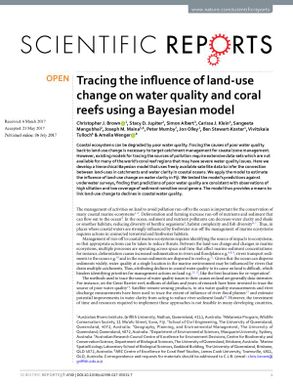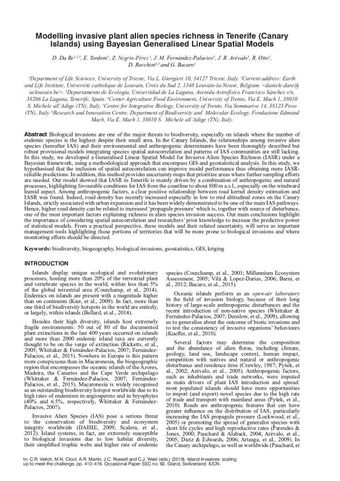Tracing the influence of land-use change on water quality and coral reefs using a Bayesian model
- Description:
- Coastal ecosystems can be degraded by poor water quality. Tracing the causes of poor water quality back to land-use change is necessary to target catchment management for coastal zone management. However, existing models for tracing the sources of pollution require extensive data-sets which are not available for many of the worlds coral reef regions that may have severe water quality issues. Here we develop a hierarchical Bayesian model that uses freely available satellite data to infer the connection between land-uses in catchments and water clarity in coastal oceans. We apply the model to estimate the influence of land-use change on water clarity in Fiji. We tested the models predictions against underwater surveys, finding that predictions of poor water quality are consistent with observations of high siltation and low coverage of sediment-sensitive coral genera. The model thus provides a means to link land-use change to declines in coastal water quality
- Display date:
- 2017
- Collections:
- Secretariat of the Pacific Regional Environment Programme (SPREP)
- Publisher:
- Scientific Reports
- Content partner:
- Secretariat of the Pacific Regional Environment Programme (SPREP)
- Availability:
- Not specified
-
Copyright status: All rights reservedFind out more about what you are able to do with this itemThis item is all rights reserved, with means you'll have to get permission from Secretariat of the Pacific Regional Environment Programme (SPREP) before using it. For more information, please see our use and reuse page.What can I do with this item?Non-infringing useNZ copyright law does not prevent every use of a copyright work, and this item may be hosted by an international institute or organisation. You should consider what you can and cannot do with a copyright work.No sharingYou may not copy and/or share this item with others without further permission. This includes posting it on your blog, using it in a presentation, or any other public use.No modifyingYou are not allowed to adapt or remix this item into any other works.No commercial useYou may not use this item commercially.
Related items
Welcome and warm Pasifik greetings
The information on this site has been gathered from our content partners.
The names, terms, and labels that we present on the site may contain images or voices of deceased persons and may also reflect the bias, norms, and perspective of the period of time in which they were created. We accept that these may not be appropriate today.
If you have any concerns or questions about an item, please contact us.

